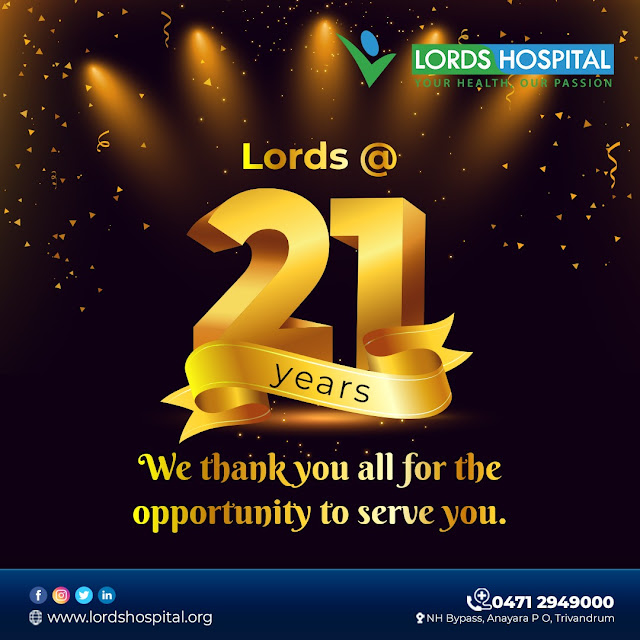Is Bariatric Surgery effective for Weight Loss
Lords Hospital in Thiruvananthapuram, Kerala has carved out an identity as the first choice of informed patients. An important destination in the medical tourism circuit, Lords hospital is a preferred center of excellence for patients who seek advanced treatment options in India. Lord’s hospital is rated high across all parameters with the founder holding a reputation as a luminary in the field of specialist procedures. Padma Shri Prof.Dr.K.P.Haridas, the founder of Lord’s Hospital scripted history by conducting the first liver resection in Kerala, almost four decades ago. The advanced nature of procedures and exceptional outcomes has earned the doctor a reputation as one of the best weight loss surgeon in Thiruvananthapuram, Kerala, India.
Bariatric surgery is nothing but the common term collectively used for several kinds of weight-loss surgeries. These surgeries make changes to your digestive system to help you reduce. They either limit the number of foods you'll intake or reduce your ability to take in nutrition and in some cases both. Such sorts of surgeries are done when diet or exercise plans haven't figured out for the person and when the person has some serious health condition as a result of their weight.
Is Bariatric Surgery effective for Weight loss?
Bariatric surgery is often life-changing for those that want to reduce. It can produce sustainable weight loss in obese people that haven't achieved long-term success with other weight loss attempts. Bariatric surgery reduces the stomach’s storage capacity, which limits food intake and helps you're feeling full much before normal. Some bariatric procedures also limit the absorption of calories. However, most patients who undergo bariatric surgery and make a commitment to sustained weight loss see a big improvement in their overall health. Achieving a healthier weight can help eliminate apnea, reverse type 2 diabetes, and improve high vital sign, which may cause an extended, healthier life.
Benefits of bariatric surgery
Improved cardiovascular health
Weight loss surgery decreases a person’s risk of coronary heart condition, stroke and peripheral heart condition. The weight loss achieved from the surgery can help prevent the danger of death related to stroke, hypertension and myocardial infarct. Blood pressure and cholesterol levels can return to normal, or near normal after surgery, reducing these risks and improving overall well-being.
Relief of depression
People feel depressed because of poor body image and social stigma. Even younger folks that carry significant excess weight find it difficult to participate in activities they might otherwise enjoy, leading to social isolation and depression. Losing this excess weight can improve emotional health.
Joint pain relief
Carrying around excessive weight puts plenty of stress on your weight-bearing joints, often causing chronic pain and joint damage. The significant and sustained weight loss that happens after bariatric surgery relieves the strain on joints and sometimes allows people to prevent using pain medications and luxuriate in far more mobility.
Improve fertility
Weight loss surgery also can improve fertility during childbearing years. It is reported that the risk of miscarriage may decline after bariatric surgery and can improve menstrual cycles in women who don’t ovulate.
Types of bariatric surgery
Each sort of bariatric surgery has pros and cons. Be sure to speak to your doctor about them. Here's a glance at common sorts of bariatric surgery:
Roux-en-Y gastric bypass (RYGB): This procedure is the most common method of gastric bypass. It works by decreasing the quantity of food you'll erode one sitting and reducing absorption of nutrients. The doctor cuts across the top of your stomach, sealing it off from the rest of your stomach. The resulting pouch is about the dimensions of a walnut and may hold only about an oz of food. Food then goes into this small pouch of stomach then directly into the tiny intestine sewn thereto. Food bypasses most of your stomach and therefore the first section of your intestine, and instead enters directly into the center a part of your intestine.
Sleeve gastrectomy: With sleeve gastrectomy, of the stomach is removed, leaving a long, tube-like pouch. This smaller stomach can't hold as much food. It also produces less of the appetite-regulating hormone ghrelin, which may lessen your desire to eat. Advantages to this procedure include significant weight loss and no rerouting of the intestines.
Biliopancreatic diversion with duodenal switch: this is often a two-part surgery during which the primary step involves performing a procedure almost like a sleeve gastrectomy. The second surgery involves connecting the top portion of the intestine to the duodenum near the stomach (duodenal switch and biliopancreatic diversion), bypassing the bulk of the intestine. This surgery both limits what proportion you'll eat and reduces the absorption of nutrients. While it's extremely effective, it's greater risk, including malnutrition and vitamin deficiencies.
Intragastric Balloon: during this weight loss surgery a saline-filled balloon made from silicon is fixed within the stomach. This helps the patient to reduce because the amount of food eaten is restricted. And it makes the person feel full even with small portions.
Endoscopic Sleeve Gastroplasty: one among the newest sorts of weight loss surgery is endoscopic sleeve gastroplasty. In this procedure, the dimensions of the patient's stomach are reduced with the assistance of the endoscopic suturing device. When an individual's body mass index is above, also as their diet and exercise plan, hasn’t figured out then this surgery is suggested. A significant loss of weight is often observed through the procedure of endoscopic sleeve gastroplasty because the surgery limits the food intake and moreover the operation is a smaller amount invasive and the number of complications is also less.




Comments
Post a Comment